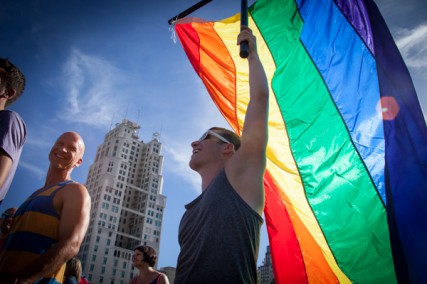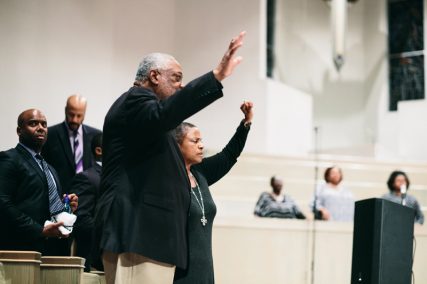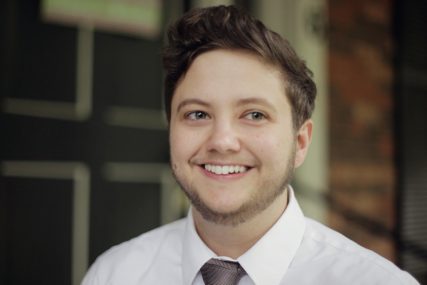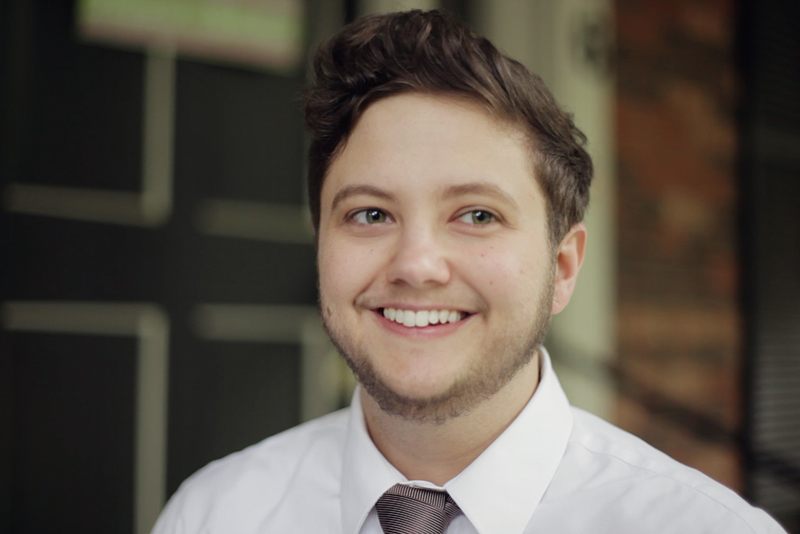
Wes Warner (right) holds a gay pride flag during a rally celebrating the Supreme Court’s gay marriage ruling at Ilus W. Davis Park in Kansas City, Mo., on June 26, 2013. RNS photo by Sally Morrow
(RNS) Last week, the Presbyterian Church (USA) ratified an amendment to its constitution to say that marriage is now between “two people, traditionally, a man and a woman.” Pastors and congregations still retain the prerogative to marry or decline to marry any couple, gay or straight.
Last week also saw a whirlwind of controversy over American Baptist College’s invitation to Bishop Yvette Flunder to speak because she is married to a woman. Flunder shared this note with the National Religious Leaders Roundtable of the LGBTQ Task Force: “I was preaching a much protested sermon last night at American Baptist College when the (Presbyterian) vote was made public. Please know that March 17 will be remembered as a day of freedom for me and our community for years to come.”
And, just days ago, the Central Conference of American Rabbis, the rabbinical arm of the Reform movement, installed its first openly gay president, Rabbi Denise Eger. On Eger’s wall is her scriptural mandate from Micah 6:8: “What does God require of you? To do justice, to love compassion and walk humbly with your God.”
“We have to open the doors wider, and open the tent wider, and open the synagogue wider, and open the (Jewish community centers) wider, and open the Federations wider,” she said. “So that’s my goal to help Jews become more Jewish — to open the doors wider.”

Bishop Yvette Flunder, right, pastor of City of Refuge United Church of Christ in Oakland, Calif., and leader of the Fellowship of Affirming Ministries, preached on Tuesday (March 17, 2015) during an annual lecture series of the American Baptist College in Nashville, Tenn. Religion News Service photo by Rebecca Adler Rotenberg (www.rebeccaadlerphoto.com)
In the context of the Presbyterian Church (USA) and the church universal, the changes that are happening are simply helping Christians be more Christian. Christians are at our best when we are living the greatest commandments, to love God and to love neighbor. But like the person testing Jesus in his day, we too ask, “Who is my neighbor?”
Jesus told the story of the Good Samaritan to help the Jewish world of his day be more Jewish — to open the doors wider. Today, Christians like to think of ourselves as Good Samaritans, but many churches think they are Samaritans simply because they help the needy. While helping those in need is vital, that is not the point of the story of the Good Samaritan parable.
The real point of this story is being able to identify with the Samaritan, the outsider, the one whom the church and synagogue reject. The point is to look at that person and say, “I want to be like Bishop Flunder who married her wife and refuses to bow to attacks.” Or to say, “I want to be like my transgender sister and brother who risk their lives every day just to be themselves.” Or “I want to be like the lesbian and gay Christians who chose to love the church, in spite of being scorned.”
The call to be a Good Samaritan is, by definition, a call to love and serve people who are different.
The future of faith is shining bright because love is replacing fear. God calls us to freedom. God broke the chains of slavery in Exodus. God cried out for generous justice through the prophets. Jesus walked this earth with an unceasing message of abundance for all God’s beloved. God continues to break through our fears.

Alex Patchin McNeill is the executive director of More Light Presbyterians and is a graduate of Harvard Divinity School. Photo courtesy of More Light Presbyterians
As Christians, the words of Galatians 3:28 continue to gain meaning: “There is no longer Jew or Gentile, slave or free, male and female. For you are all one in Christ Jesus.” When we look around, we see that our Creator is amazingly imaginative. We are all a reflection of the image of God.
In this journey of understanding of who we are, we are not winning a “battle” to gain full acceptance of LGBT people in churches, synagogues — and yes, mosques, temples and houses of worship. Rather, we are helping our faith traditions be the best faith traditions they can be.
(Alex Patchin McNeill is the executive director of More Light Presbyterians and is a graduate of Harvard Divinity School.)
KRE/AMB END MCNEILL





